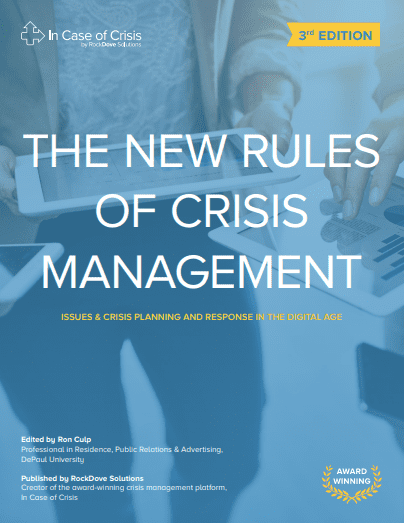The New Rules of Crisis Management — 3rd Edition 2019 | In Case of Crisis by RockDove Solutions
B2B Digital Marketing
There is a gap between board member perceptions of readiness and companies actually having a crisis plan was substantial. A recent survey by Deloitte 80% of organizations worldwide have had to mobilize their crisis management teams at least once in the past two years.
What Is Crisis Management?
To sum this up, simply, the crisis is a problem that affects your business and needs crisis management in order to get back on track. The purpose of crisis management is to exclude the possible harm and allow the organization to resume the execution of its strategy.
At the time of crisis, companies or organizations have to respond without delay to solve the problem and to lessen\prevent the possible damage to the employees, property, reputation and organizational interests.
To this end, in this guide, you’ll find the new rules for crisis management, and all that individuals and companies need to regularly assess and plan for potential crises.
Keep on reading and download the full PDF file.
PR Crisis Management and the Need for Speed in the Digital Age:
We live in the age of social media. News is instantaneous. Mobile phones are prolific. You need to begin communicating at least the basic facts fast. Anything over one hour is unacceptable.
If you fail to provide a spokesperson, by default you have ordained an eyewitness as your spokesperson. Ultimately, the reputation and revenue of your organization hang in the balance when you are slow to communicate.
Here are the lessons every company, non-profit, and government agency must recognize:
- When you are slow to communicate, you damage your reputation and revenue.
- You must make decisions on a clear sunny day that dictates how you will respond on your darkest day.
- You must write news release templates on a clear sunny day so they can be quickly edited and used on your darkest day.
Read Also: 10 Useful Social Media Management Strategies in Times of Crisis: COVID-19 Outbreak 2020
What’s in “The New Rules of Crisis Management – 3rd Edition 2019”:

The New Rules of Crisis Management eBook — 3rd Edition
- Introduction
- Chapter1: Adjusting your crisis\reputation management approach for the digital age
- Chapter2: Crisis communications considerations for professional services firm in the digital age
- Chapter3: Leveraging employees as ambassadors, advocates, and authentic voices during a crisis in the digital age
- Chapter4: Legal considerations for crisis communicators in the digital age
- Chapter5: The need for speed in the digital age
- Chapter6: The importance of data and analytics in the digital age
- Chapter7: Crisis implications for brands in the digital age
- Chapter8: How to create an effective crisis preparedness
- Chapter9: Balance technology with the human element for crisis management success in the digital age
- Chapter10: Strategies for crisis communications and attorneys to work more effectively in the digital age
- Chapter11: Successfully navigating higher ed crises and issues in the digital age
- Chapter12: The cybersecurity threat and managing reputation risk in the digital age
- Resources
Number of Pages:
- 88 pages
Pricing:
- Free







